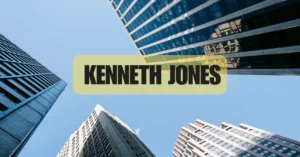It was a brisk morning in Oklahoma City when Michael McBride III stepped into the town hall, his presence as understated as it was unmistakable. No security entourage. No dramatic entrances. Just a man in a charcoal-gray suit, carrying with him a quiet intensity, a legal pad, and a mission: to help Oklahoma find clarity in a time of confusion.
In a state marked by political realignment, rural-urban divides, and a generational tug-of-war, Michael McBride III News Oklahoma has become a rare figure—part lawyer, part advocate, part civic innovator. Over the past year, his name has surfaced with increasing frequency in local newsrooms, statehouse corridors, and nonprofit roundtables. And though not yet a household name nationwide, within Oklahoma, he is rapidly becoming a symbol—of both the state’s historical roots and its unresolved tensions.
This is not a story about scandal or sensation. It’s the kind of story that unfolds slowly, quietly, with consequence—about leadership, about identity, and about the local battles that increasingly reflect our national character. “Michael McBride III News Oklahoma”
READ MORE: Newtopy: Charting the Terrain of a Transformative Concept
1. Who Is Michael McBride III?
Born in Tulsa and raised between Muskogee and Norman, Michael McBride III News Oklahoma represents a generational bridge. The grandson of a civil rights-era pastor and the son of a public school teacher and community activist, McBride’s upbringing was deeply shaped by service, scripture, and struggle.
He studied political science at Oklahoma State before attending law school at Howard University—a nod, he says, to both his heritage and his hunger for systems thinking. “My family taught me the language of faith and justice,” he shared in a 2024 public lecture, “but Howard taught me how systems are written—and rewritten.”
By his early 30s, McBride had returned to Oklahoma not as a politician, but as a legal reform strategist, working with disenfranchised communities across the state. His focus: juvenile justice, land rights, and public accountability. But it wasn’t until a series of community-led court interventions in 2023 that he broke into the public’s view. “Michael McBride III News Oklahoma”
2. The News That Sparked a Movement
In April 2023, the Oklahoma news cycle was dominated by a quietly explosive story: the illegal seizure of ancestral Black farmland in Choctaw County, allegedly brokered through a network of real estate developers and county clerks. The legal filings were obscure. The victim families lacked legal representation. The state seemed unwilling to intervene.
But McBride didn’t.
Instead of grandstanding, he assembled a team of land use experts, genealogists, and tribal liaisons. He didn’t just file suit—he unearthed maps, interviewed elders, and led public teach-ins across churches, schools, and libraries. His efforts didn’t just win a court case—they reawakened public interest in land memory and Black-Indigenous legal history across eastern Oklahoma.
That case, known locally as McBride v. Choctaw Clerk’s Office, didn’t just make news. It made meaning.
3. Legal Advocacy with a Civic Soul
What distinguishes McBride from many in Oklahoma’s legal scene isn’t just his success rate—but his philosophy. He’s a courtroom tactician, but also a believer in what he calls “legal listening”: the practice of interpreting the law not just for argument, but for understanding the emotional logic of a community.
In an era when legal battles are often reduced to viral moments or televised takedowns, McBride’s approach is the opposite: low-ego, high-impact. He meets with elders before hearings. He opens town hall dialogues after rulings. He insists that his clients—not his own voice—speak first at press conferences.
And increasingly, this method is catching on. As more young lawyers emerge from Oklahoma’s universities—many of them first-generation or multilingual—McBride’s model is being replicated in education, climate policy, and tribal law.
READ MORE: Submodica: Enhancing Subnautica Gameplay with Mods
4. The Press and the Person
The Oklahoma news ecosystem has taken notice. And yet, McBride’s media strategy is almost unnervingly quiet in a time of personality-driven politics. He refuses to appear on national cable news. He’s declined several podcast invitations. He doesn’t tweet. His press releases come not from a PR firm, but from a free Substack newsletter called “Common Counsel.”
It’s a deliberate choice. “Narrative moves faster than nuance,” he said at a university panel in early 2025. “And I’d rather be understood slowly than misquoted loudly.”
Local journalists, however, are seeing McBride as an unusually cooperative figure. He provides records, not spin. Context, not clickbait. And while his commentary is often guarded, his openness to critique has earned him trust even across ideological lines. “Michael McBride III News Oklahoma”
5. A Rising Voice in Restorative Justice
One of McBride’s most influential projects is the Oklahoma Youth Reclamation Project, a legal and community initiative focused on redirecting teens from the criminal justice system into mentorship-based restorative circles.
Launched quietly in Tulsa in early 2024, the program pairs first-time nonviolent juvenile offenders with community elders, artists, and counselors. Rather than facing formal prosecution, participants engage in weeks-long “truth cycles”—culminating in a public restitution process.
The results: a 78% drop in reoffense rates, according to an independent 2025 study, and a surge in public funding support from both Democratic and Republican lawmakers.
6. Faith, Race, and the Local Roots of Power
McBride identifies as a Christian—but emphasizes a theology of justice and inclusion, not dogma. He speaks in the cadence of the Black church tradition but reads Foucault and Baldwin. And while many place him on the political left, his partnerships stretch across Oklahoma’s political divide.
He’s worked with conservative farmers on soil conservation laws. He’s lobbied for Indigenous rights alongside Cherokee Nation representatives. And in the wake of recent abortion legislation changes in Oklahoma, he organized confidential legal clinics for both pregnant teens and anti-abortion pastors—holding space for both law and conscience.
It’s not neutrality. It’s integrity through complexity.
7. The Next Chapter: Public Office?
With McBride’s growing recognition, rumors of a 2026 state attorney general run have intensified. Local organizers have begun quietly building exploratory committees. Donors from both urban and rural Oklahoma have pledged early support.
McBride himself has neither confirmed nor denied his interest. “Right now, I serve from the ground, not the podium,” he said in March 2025. “But I’m listening.”
Should he run, it would be a historic campaign—not for its spectacle, but for its substance. His candidacy would test whether civic sobriety can still beat partisan spectacle in the age of outrage politics. “Michael McBride III News Oklahoma”
8. A Mirror for a Changing State
Oklahoma is not the state it was a generation ago. The energy sector is diversifying. Rural populations are shrinking, but innovation hubs are growing. The racial makeup is shifting, as is the ideological terrain.
In this context, Michael McBride III News Oklahoma is not merely a legal advocate—he is a mirror. One that reflects both the potential and the unfinished struggles of a state trying to reconcile its past with its possibility.
9. Journalism in the Age of Quiet Leaders
In an era dominated by influencers and political extremes, figures like McBride challenge the logic of media itself. His story doesn’t lend itself to viral headlines. There’s no scandal. No soundbite. Just work.
And yet, it is precisely this model—quiet, complex, careful—that many in Oklahoma are turning toward. Not because it is perfect, but because it feels real.
Frequently Asked Questions (FAQs)
1. Who is Michael McBride III?
Michael McBride III is an Oklahoma-based legal reform strategist and civic advocate known for his work in restorative justice, land rights, and community-led legal education.
2. Why has he been in the news recently?
He gained statewide attention for leading a legal case involving ancestral Black farmland and for launching youth restorative justice programs in Tulsa.
3. Is Michael McBride III running for public office?
While rumors suggest a possible 2026 run for Oklahoma Attorney General, McBride has not officially announced any political campaign.
4. What is his political affiliation?
McBride operates independently and often works across partisan lines. He identifies with progressive ethics but collaborates with leaders from all ideologies.
5. How can people follow his work?
McBride publishes a public newsletter titled “Common Counsel” and is active in Oklahoma-based legal and educational workshops, though he avoids traditional social media.









